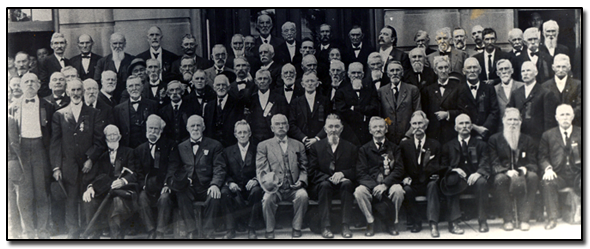117th Infantry FAQs
The “McKendree Regiment”: The 117th Illinois Volunteers
When the North and South went to battle in the mid-nineteenth century, McKendreans
quickly prepared to serve. At least 150 who were students before or after the Civil
War served, and it is most likely all were volunteers. Not less than 30 faculty and
students became military officers. In September of 1862, McKendreans formed the 117th
Regiment of Illinois Volunteers. After training at Camp Butler, the 117th headed out
to face the enemy, fighting in five battles and 33 skirmishes, including being present
at Vicksburg under General Ulysses S. Grant.
From 1845 to 1862, Risdon M. Moore was a student, tutor and professor at McKendree
College. Moore started forming the “McKendree Regiment” on August 5, 1862, soon after
President Abraham Lincoln’s request for 300,000 additional men. As of September 19,
he became the regiment’s colonel.
The 117th finally departed on November 11. Having received defective rifles and thus
without arms, the regiment was stationed at Fort Pickering for two years. Twice, it
was sent to General Grant at Vicksburg, a key Confederate hold on the Mississippi
River. In December 1863, it chased the well-known Confederate General Nathan Bedford
Forrest, who had been raiding western Tenn. and northern Miss. On April 9th, 1864,
the regiment fought at the Battle of Pleasant Hill and came out victoriously. In June,
Union General Sturgis’ command fell under heavy assault by Forrest, the troops badly
broken up. According to Moore, the general should have been held responsible for “that
disgraceful affair.” Thus, the 117th set out “for the work that Sturgis failed to
do - whip Forrest.” The Northern troops fought in several succeeding engagements and
“chastised Forrest severely.” The regiment later rushed off to Nashville in late 1864
to support General George Thomas against Confederate General John Bell Hood, then
chased Hood’s men to the Tennessee River, which resulted in the capture of many Confederate
prisoners and artillery pieces. The McKendree Regiment’s final battle was fought at
Fort Blakely on April 9, 1865, the same day that the great Confederate General Robert
E. Lee surrendered.
The 117th Illinois Regiment participated in a total of 38 engagements. It was mustered
out on August 5, 1865.
Civil War Reenactment
 The McKendree campus traveled back in time to the mid-nineteenth century on the weekend
of April 7-9, 1995. Over these three days, McKendree and the residents of Lebanon
were blasted nearly 150 years into the past when various events took place on campus
and in town, the climax being an exciting reenactment of a Civil War skirmish. Overall,
12 cannons, 27 cavalry, some 80 civilians dressed in period costumes, and nearly 150
reenactors representing Confederate and Union soldiers were involved in this weekend
of activities.
The McKendree campus traveled back in time to the mid-nineteenth century on the weekend
of April 7-9, 1995. Over these three days, McKendree and the residents of Lebanon
were blasted nearly 150 years into the past when various events took place on campus
and in town, the climax being an exciting reenactment of a Civil War skirmish. Overall,
12 cannons, 27 cavalry, some 80 civilians dressed in period costumes, and nearly 150
reenactors representing Confederate and Union soldiers were involved in this weekend
of activities.
The events began with a reenactment of the best of the 1858 Lincoln-Douglas debates.
Later, Lebanon’s Looking Glass Theater staged a production of “Our American Cousin”
- the play Lincoln had seen when he was assassinated - and “A Visit With Lincoln.”
Other activities for the public included a parade through town, a Civil War-era fashion
show and a ladies’ tea. A commemorative ceremony was held in honor of those who had
served in the “McKendree Regiment.” A reactivation of the 117th also occurred, with
the mustering of both students and faculty into the regiment. A grand ball where participants
dressed in formal period attire was thrown in Peasons Hall, now the site of the 1828
cafe. A Latin Catholic field mass and a Methodist church service in Bothwell Chapel,
both of which were conducted as period services, also took place. Finally, a skirmish
was fought in Lebanon and on the front lawn of McKendree campus between the Confederate
and Union reenactors.
Sources: Centennial McKendree College History, 1828-1928 ; “The McKendree Regiment: or the 117th Illinois Infantry” by Risdon M. Moore in
The McKendree Pigskin, 1905; McKendree College Bulletin, Summer 1995 issue.
Photo: 117th reunion.
